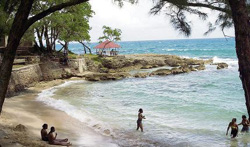$6m needed for scientific study of Negril
beach
Claudia Gardner, Hospitality Jamaica Writer
THE NEGRIL Beach Rejuvenation Committee has submitted a
proposal to the Environmental Foundation of Jamaica (EFJ), seeking
$6 million to undertake a scientific study of the Negril beach which
has been experiencing dramatic rates of erosion.
 |
|
A stretch of beach in Western Jamaica.
|
According to president of the Negril Chamber of Commerce, Wayne
Cummings, the committee is expecting that the project, if approved
will take six months to be completed.
"Time is of the essence, there is no letting up, the beach
is in as bad a shape as it has ever been, so we are hoping that
the EFJ will be getting back to us very early in the year, to tell
us whether or not the proposal has been approved because we now
need to move ahead," Mr. Cummings told Hospitality Jamaica
in an interview last Thursday.
"It still remains a crisis. All that has happened is that
we've agreed on the way forward. No remedial work has been done,"
he said. "I think in the last month, with the rains abating,
we have come back to a semblance of normalcy. Some areas are still
without sand, some have netted a little more than others. As long
as there is no further rains and significant wave action, we are
holding strain. But we can no longer continue to hold strain; we
need to see improvements," he added.
Mr. Cummings said the National Environment and Planning Agency
(NEPA) has given significant input to the proposal, although they
had not been attending the meetings.
"While they have a seat on the committee, they (NEPA) have
not been attending the meetings, and they did excuse themselves,
but they made a joint presentation with the Negril Coral Reef Preservation
Society (NCRPS) and the Negril Area Environment Protection Trust
(NEPT) at our first meeting that was chaired by the Minister (Dr
Wykeham McNeill). So, the proposal that has been sent forward has
had an input by NEPA, because they have been, over the last couple
of years, doing measurements of the beach and they were able to
infuse that (in the proposal)."
A one year study of the beach erosion problem in Negril by the
Department of Geology and Geography of the University of the West
Indies (UWI) in collaboration with the Coastal Zone Unit of the
National Resources Conservation Authority (NRCA) conducted between
1999 and 2000, concluded that the northern section of the Long Bay
Beach has been experiencing shoreline erosion.
The study, which was funded by the Coastal Water Improvement Project
(CWIP), revealed that some areas of the beach fluctuate between
35 and 40 metres. It recommended that feasibility studies be undertaken
to develop other alternatives to protecting the shoreline, including
the cultivation of seagrass meadows, (which help to manufacture
sand) and the removal of plant life, which were reported to be smothering
Negril's deep reefs.
|

